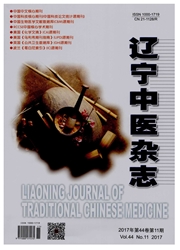

 中文摘要:
中文摘要:
目的:系统评价中医理气和胃法治疗慢性胃炎的临床疗效。方法:检索PubMed、OVID数据库和中国知网与维普中文科技期刊全文数据库的英文和中文随机对照试验(RCT)文献,将Jadad积分≥1分的以慢性胃炎患者为研究对象的临床随机对照试验文章纳入研究,并提取纳入研究的特征信息。采用Revman 5.2软件进行Meta分析,检验异质性,并根据异质性结果选择相应的效应模型,最后绘制漏斗图及Egger回归方程评定有无发表偏倚。结果:最终有9项RCT,共1076例患者入选,文献质量普遍较低。理气和胃法治疗慢性胃炎的总体疗效优于单纯的西医治疗,其汇总OR=6.77,95%CI(4.39,10.43),差异均具有统计学意义(P〈0.0001)。漏斗图显示左右两侧的点估计值分布不对称,说明发表偏倚可能性大,有2篇文章处于漏斗的底部,说明其样本量偏小。线性回归常数项检验统计量表明存在发表偏倚。结论:理气和胃法治疗慢性胃炎,在总有效率方面可能优于单纯西医治疗组,但尚需更多高质量研究以增加证据的强度。
 英文摘要:
英文摘要:
Objective : To systematically evaluate the efficacy of regulating qi and harmonizing stomach in the treatment of chro- nic gastritis. Methods:The randomized clinical trials (RCTs) that compared the efficacy or safety of traditional Chinese medicines and Western medicines in the treatment of chronic gastritis were retrieved by searching PubMed, OVID, CNKI and VIP Chinese Scientific and Technological Periodical Database. Trials were considered to be of high quality if the Jaded scale score was 1 or more. Statistical heterogeneity between trials was evaluated using Revman 5.2. Heterogeneity of the included articles was tested to select proper effect models for calculation. Publication bias was investigated through visual inspection of funnel plots and Egger's regression model. Results :Nine RCTs including 1076 patients were analyzed. The quality of RCTs were generally low. Compared with Western medicine group, regulating qi and harmonizing stomach adopted based on the theory of Chinese medicine treatment significantly improved excellent response rate, overall response rate of chronic gastritis. OR = 6.77,95 % CI (4.39,10.43). The difference was statistically significant (P 〈 0. 0001 ). Conclusion : Regulating qi and harmonizing stomach based on the theory of traditional Chinese medicine treatment may be superior to Western medicines in improving excellent response rate, overall response in patients with chronic gastritis. More high quality research is needed to increase the strength of the evidence.
 同期刊论文项目
同期刊论文项目
 同项目期刊论文
同项目期刊论文
 Hec1 by Mitotic Kinase Aurora B Specifies Spindle Checkpoint Kinase Mps1 Signaling at the Kinetochor
Hec1 by Mitotic Kinase Aurora B Specifies Spindle Checkpoint Kinase Mps1 Signaling at the Kinetochor HP1? interacts with borealin and specifies the centromere localization of chromosomal passenger comp
HP1? interacts with borealin and specifies the centromere localization of chromosomal passenger comp Evidence-Based Novel Changes in Prevalence and Symptom Characteristics of Spleen Deficiency Syndrome
Evidence-Based Novel Changes in Prevalence and Symptom Characteristics of Spleen Deficiency Syndrome EB1 acetylation by P300/CBP-associated factor (PCAF) ensures accurate kinetochore-microtubule intera
EB1 acetylation by P300/CBP-associated factor (PCAF) ensures accurate kinetochore-microtubule intera Phosphorylation of the Bin, Amphiphysin, and RSV161/167 (BAR) domain of ACAP4 regulates membrane tub
Phosphorylation of the Bin, Amphiphysin, and RSV161/167 (BAR) domain of ACAP4 regulates membrane tub 期刊信息
期刊信息
